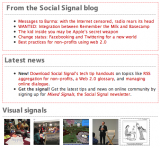I've been looking into options for improving task management with Basecamp, given my frustration with Basecamp's lack of due dates or task details.
Basecamp is what I need to manage the big picture of projects, keep in touch with clients, and assign tasks to my team, subcontractors, and client staff. I wrote up a pretty detailed picture of how we're doing this in my post about our Basecamp workflow.
But Basecamp is not a good tool for personal task management. That's why I use -- and quite like -- Remember the Milk, a very sophisticated yet intuitive task manager. RTM lets you categorize tasks into categories (lists) of your choice, tag any task, associate tasks with locations, assign priorities and due dates to tasks, share tasks with colleagues -- basically anything you might need to do to manage your tasks effectively. And it has lots of nice add-ons, like an iGoogle widget that you can even use to view RTM tasks in your Firefox sidebar.
As it stands, the combo of Basecamp and RTM is pretty unsatisfying. I have to manually copy my Basecamp to-dos into my RTM lists. And then when I complete a task, i have to mark it complete in both places.
Since many of my tasks are independent of particular client projects, it doesn't make sense to manage all my tasks from within Basecamp (especially considering the limitations of the Basecamp task system). What I really want is to create and manage most of my tasks from within RTM, but still be able to include my Basecamp tasks in the RTM system.
I'm hoping the RTM team will make this possible by building a bridge to the Basecamp API. Ideally RTM would first introduce nested lists, so that each Basecamp project could be an RTM list (tab). A basecamp to-do list could become a nested list on that tab, with tasks listed inside the nested sublist.
It's a little trickier without nested lists, but I'd still settle for a dump of all my tasks in a given project, directly into an RTM tab/list of the same name. I'd lose the in-between layer of to-do list names within Basecamp, but I can live with that -- especially if completing a task in RTM marks it complete in Basecamp.
The RTM team is the obvious gang to take this on, especially since they are looking for value-added options that would induce people to pay for RTM Pro (I'd happily pay more than $25/yr for Basecamp integration, myself -- I could imagine $10/month as a fair pricepoint).
But the RTM folks are busy, busy, busy. So I'm hoping there are other developers out there -- people who could use the RTM and Basecamp APIs to build this sync function without the official blessing of either service. If this sounds like you, let us know how we could help make this happen. And if this mashup sounds like something you'd want, leave a comment so we can figure out whether there's enough interest to warrant a development bounty.





